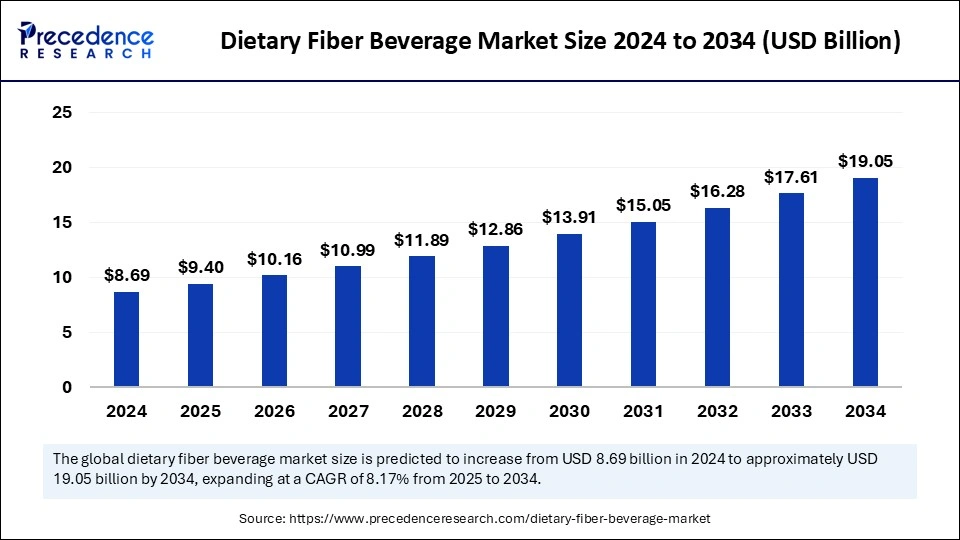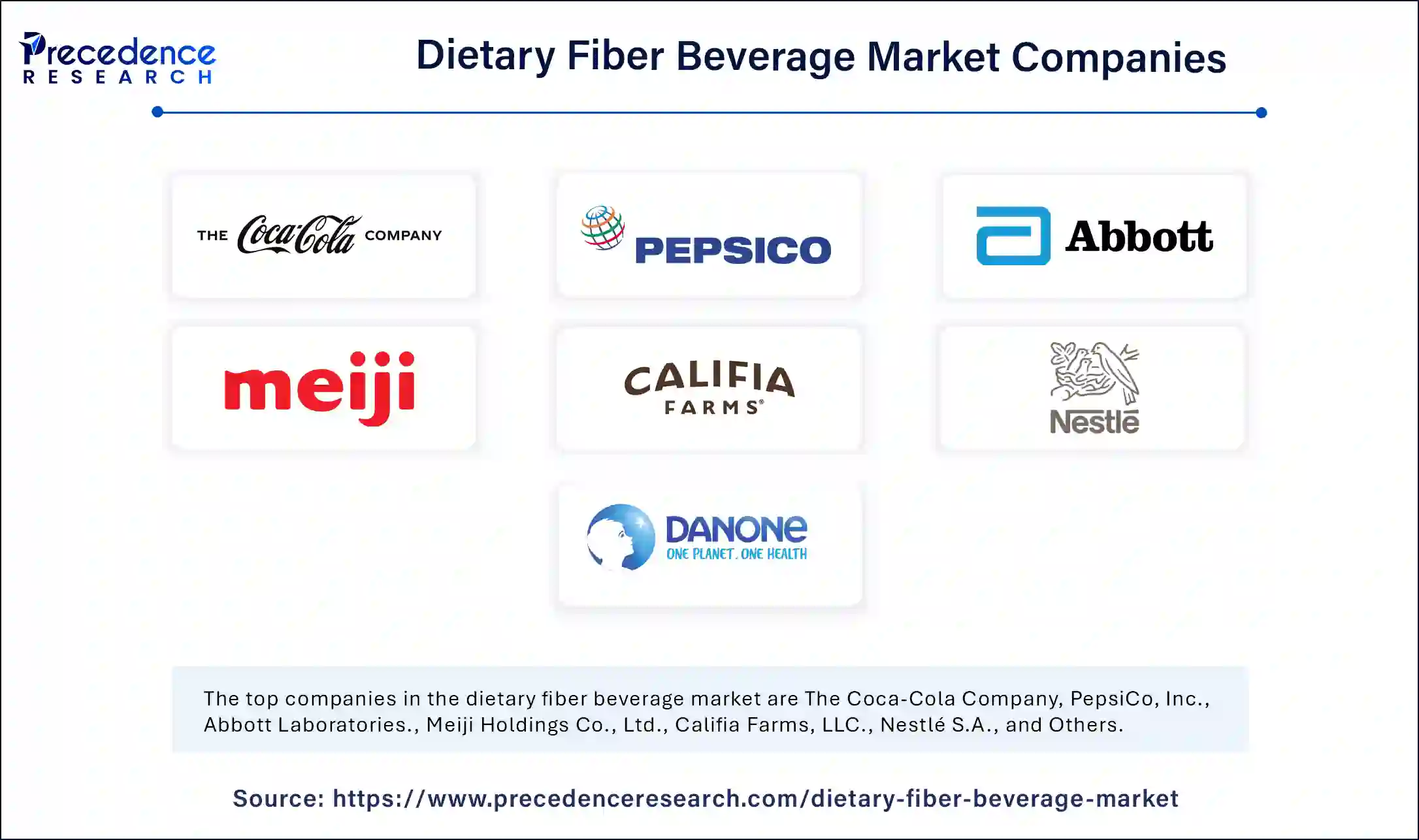Dietary Fiber Beverage Market Size to Gain USD 19.05 Billion by 2034
Dietary Fiber Beverage Market Size and Forecast 2025 to 2034
The global dietary fiber beverage market size was valued at USD 8.69 billion in 2024 and is expected to gain around USD 19.05 billion by 2034, growing at a CAGR of 8.17%.

Get a Free Sample Copy of the Report@ https://www.precedenceresearch.com/sample/5743
Dietary Fiber Beverage Market Key Takeaways
-
With a 37% market share in 2024, North America dominated the industry.
-
Asia Pacific is projected to grow at a strong CAGR in the coming years.
-
The shakes/smoothies segment led the market, accounting for 52% of the total share in 2024.
-
The tea/coffee segment is set to experience remarkable growth during the forecast period of 2025 to 2034.
-
The ready-to-drink segment held the largest market share of 63% in 2024.
-
The ready-to-mix category is expected to witness the highest growth rate between 2025 and 2034.
-
The inulin segment was the leading fiber type, capturing 41% of the market in 2024.
-
Hypermarkets/supermarkets maintained their dominance in the distribution channel, with a 46% share in 2024.
-
Online retail is expected to emerge as a key growth driver from 2025 to 2034.
Role of AI in the Dietary Fiber Beverage Market
Artificial intelligence is playing a transformative role in the dietary fiber beverage market by optimizing product development, enhancing supply chain efficiency, and improving consumer engagement. AI-powered analytics help beverage manufacturers analyze consumer preferences, dietary trends, and nutritional requirements, enabling the creation of fiber-rich beverages tailored to specific health needs. By leveraging machine learning algorithms, companies can identify emerging ingredients and formulations that enhance the taste, texture, and functional benefits of dietary fiber drinks.
AI is also improving supply chain management by predicting demand patterns and optimizing inventory levels, reducing waste and ensuring timely product availability. Smart manufacturing processes driven by AI enhance quality control by detecting inconsistencies in ingredient composition and maintaining consistency in taste and texture. Additionally, AI-driven personalization tools allow brands to recommend dietary fiber beverages based on consumers’ health goals, lifestyle, and purchasing behavior, improving customer satisfaction and brand loyalty. As AI continues to advance, its integration into the dietary fiber beverage industry will drive innovation, efficiency, and consumer-centric product development.
Dietary Fiber Beverage Market Growth Factors
The dietary fiber beverage market is experiencing significant growth due to increasing consumer awareness about digestive health, rising demand for functional beverages, and shifting preferences toward healthier lifestyles. Consumers are becoming more conscious of the benefits of dietary fiber, including improved digestion, weight management, and cardiovascular health. This growing awareness has led to a surge in demand for fiber-infused beverages, particularly among health-conscious individuals and fitness enthusiasts.
Another key factor driving market growth is the increasing prevalence of lifestyle-related diseases such as obesity, diabetes, and gastrointestinal disorders. As people seek preventive health solutions, dietary fiber beverages have emerged as a convenient and effective option. Additionally, advancements in food and beverage technology, such as the use of prebiotic and probiotic fibers, are enhancing the functional benefits of these drinks.
The expansion of online retail and e-commerce platforms has also made dietary fiber beverages more accessible, further fueling market growth. Moreover, innovations in flavors, formulations, and packaging are attracting a broader consumer base, including younger generations looking for tasty yet nutritious alternatives.
Dietary Fiber Beverage Market Overview
The dietary fiber beverage market has gained traction in recent years due to rising health consciousness and growing awareness of digestive wellness. These beverages are designed to provide an easy and convenient way to consume essential dietary fiber, helping to regulate metabolism and promote gut health. As consumers move away from sugar-laden soft drinks and toward functional beverages, fiber-infused drinks have become a popular choice. The market is being shaped by advancements in food technology, improved fiber extraction processes, and increasing demand for clean-label and natural products.
Market Scope
| Report Coverage | Details |
| Market Size by 2034 | USD 19.05 Billion |
| Market Size in 2025 | USD 9.40 Billion |
| Market Size in 2024 | USD 8.69 Billion |
| Market Growth Rate from 2025 to 2034 | CAGR of 8.17% |
| Dominated Region | North America |
| Fastest Growing Market | Asia Pacific |
| Base Year | 2024 |
| Forecast Period | 2025 to 2034 |
| Segments Covered | Type, Form, Fiber Type, Distribution Channel, and Regions |
| Regions Covered | North America, Europe, Asia-Pacific, Latin America and Middle East & Africa |
Market Dynamics
Drivers
The increasing incidence of gastrointestinal issues and metabolic disorders has fueled the demand for fiber-rich beverages. Consumers are actively seeking dietary solutions that support digestion and immunity. Additionally, the surge in health and wellness trends, particularly among millennials and fitness enthusiasts, is driving the growth of functional beverages. Government initiatives promoting dietary fiber intake and regulations limiting sugar consumption in beverages have also contributed to market expansion.
Opportunities
There is growing potential for innovation in fiber beverage formulations, particularly in developing new flavors and textures that appeal to a broader consumer base. The rise of gut-friendly ingredients such as prebiotics and resistant starches allows brands to enhance the functionality of their drinks. The increasing demand for plant-based beverages offers an opportunity for manufacturers to create fiber-enriched plant-based milk, smoothies, and herbal drinks. The rapid growth of direct-to-consumer sales and online retail platforms has also made it easier for brands to educate and engage with health-conscious customers.
Challenges
One of the biggest challenges in the dietary fiber beverage market is consumer perception regarding taste and texture. Some fiber drinks have a thick consistency that may not be preferred by all consumers. The cost of high-quality fiber ingredients can also make these beverages more expensive compared to regular soft drinks. Additionally, manufacturers face the challenge of ensuring that fiber-fortified beverages maintain stability and shelf life without compromising on quality.
Regional Insights
North America is the leading market for dietary fiber beverages, driven by increasing demand for functional drinks and a high level of health awareness among consumers. Asia Pacific is emerging as a strong market due to urbanization, changing lifestyles, and a growing middle-class population seeking healthier food and beverage choices. Europe is also seeing steady growth, particularly in countries where clean-label and organic products are in high demand. Latin America and the Middle East are expected to show gradual adoption as consumer awareness increases.
Dietary Fiber Beverage Market Companies

- The Coca-Cola Company
- PepsiCo, Inc.
- Abbott Laboratories.
- Meiji Holdings Co., Ltd.
- Califia Farms, LLC.
- Nestlé S.A.
- Danone S.A
Announcement by the Industry Players
- In September 2024, ZBiotics launched a Sugar-to-Fiber Probiotic Drink Mix to enhance gut health. Montana State University Professor Seth Walk, PhD, MS, stated, “The microbiome has been studied for hundreds of years, but we are now discovering its full potential in managing human health. ZBiotics is developing new and augmenting standing microbiome functions that scientists believe will improve human health. This is a very different approach than other companies in this space seeking to supply one organism for the masses.”
Recent Developments
- In February 2025, Oobli partnered with Ingredion to expand access to sweet proteins, a healthier sugar alternative for food and beverages.
In September 2024, ZBiotics launched Sugar-to-Fiber Probiotic Drink Mix, a genetically engineered probiotic that converts dietary sugar into prebiotic fiber to address fiber insufficiency in the American diet.
Segments Covered in the Report
By Type
- Shakes/Smoothies
- Tea/Coffee
- Carbonated Drinks
- Others
By Form
- Ready to Drink (RTD)
- Ready to Mix (RTM)
By Fiber Type
- Inulin
- FOS
- GOS
- Others
By Distribution Channel
- Hypermarkets/Supermarkets
- Convenience Stores
- Online Retails
- Specialty Stores
- Pharmacies
- Others
By Region
- North America
- Europe
- Asia-Pacific
- Latin America
- Middle East & Africa
Also Read: Cooling Fabrics Market
Ready for more? Dive into the full experience on our website@ https://www.precedenceresearch.com/
